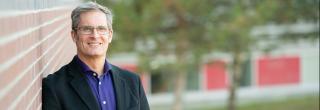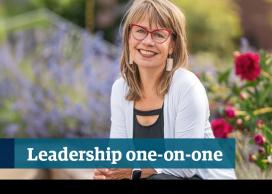Bryce Traister has been at the helm of UBC Okanagan’s Faculty of Creative and Critical Studies since the summer of 2017. Although he was born and raised in California, Bryce has spent most of his academic career in Canada, and his roots at UBC run deep. Not only is his spouse a graduate of the UBC Vancouver English department, his father-in-law was also a history professor at UBC Vancouver for more than 30 years.
Bryce came to UBC from the University of Western Ontario, where he served as chair of the Department of English and Writing Studies. He is the former director of the Centre for American Studies in the Faculty of Social Science at the University of Western Ontario, and has served as president of the Canadian Association for American Studies and as chair of the International Committee of the American Studies Association.
His research interests span a wide range of topics in cultural studies — from transnationalism and globalization to early American religious culture.
Q1. What quality do you most admire in a leader?
BT: I most admire a leader who proposes something and then gets out of the way — someone who is ready and willing to fade into the background and let other people take credit for their work. A big part of getting out of the way is being willing to accept that the outcome may not be anything like what was originally imagined.
Q2. What makes you laugh?
BT: A lot of things. If you ask people what I’m like as a person, as a colleague, or as a dean, I think they would say that I like to laugh a lot. I try to find the humour in difficult places. There’s something therapeutic about it.
Q3. Who inspires you, and why?
BT: It may sound corny, but my kids inspire me. My daughter graduated with a degree in Art History with a double minor in English and French and my son graduated with a degree in Philosophy. They did that at a time when the universal advice was to steer clear of liberal arts degrees. I admire them for ignoring the advice of their peers and the media, and studying what they loved.
I also admire them for being willing to risk the uncertainty of not knowing what these degrees would lead to. I feel like the world needs more students like that — students who will risk the uncertainty of the future, especially in the context in which they live today.
Q4. For you, what makes UBC different?
BT: I have deep appreciation and respect for world-class universities like UBC. It is an honour to be associated with the longevity of UBC’s practices and the success of those practices.
What I value most about UBC Okanagan, is how we are able to move and achieve things a little bit more quickly than you can in a larger environment. Here, there’s a real desire and drive to take a risk to try something different, and to be ok to fail.
For example, we recently reorganized the Creative and Critical Studies Faculty — we went from two departments to three and moved some programs around. It was a big undertaking. While I was the one who introduced the idea, the process was consensual and collaborative, and when it came to implementing the change, it was passed unanimously within the Faculty. The whole process took us just eight months, from start to finish. It was really astonishing.
That is the kind of thing this place enables. It was a risk. It could have failed. But my colleagues were willing to take the risk with me. I am grateful that I get to work with people who are willing to risk an uncertain future, rather than rely on the comforts and the stability of the usual or traditional way of doing things.
Q5. What is the most important lesson you’ve learned, in your career to date?
BT: That I am not always right.
When I started my academic career, I was a 28-year-old brash Berkeley-trained know-it-all. I was very committed to the strength of my ideas and as a result, had conflict with some of my colleagues. I was probably quite insufferable in certain ways.
The lesson I learned was how much more could be achieved when I was ready to allow other people in the room to talk, and for them to be right. I definitely find this hard at times, because I’m a talker! But to realize the value of just shutting up was a huge lesson for me, because once I came to that realization, the possibility of what could be achieved in my lifetime grew exponentially. It allowed me to climb down from my academic high perch, and have a much better perspective on what could be achieved when the achievement is not dependant on my having the right answer all the time.
Q6. How do you like to recharge?
BT: Physical exercise is really important to me. I’m an outdoor cyclist, although my avidity level changes depending on the season (and I find Kelowna’s hills very daunting!), so I’ve become a bit of gym rat. I also love to ski, read, and watch TV. I’m a southern California boy and spent a lot of time at the beach surfing when I was young, so I often enjoy just lying on Kelowna’s beaches as well.
Q7. What is the best advice you were ever given?
BT: Be willing to accept that there may not always be an answer. I got that advice at a time in my life when there was a fork in the road, and I had to choose which way to go. As an academic who needs to be in charge of having the right answer, I was told there just may not be one. Instead, I should focus on the right next step, and not worry about 20 years from now, five years from now, or even tomorrow. I still apply this advice today.
Q8. What do you value in your colleagues?
BT: Their willingness to listen, and their willingness to risk their own opinions. I have such respect for the deep commitment to collegial governance that we have on this campus. Even though at times, we don’t always live up to that ambition, my colleagues are always willing to keep trying for it. I especially admire it at a time when academic and collegial governance is under fire — not at UBC necessarily — but certainly across North America.
I feel very lucky to work in a culture in which we will disagree with each other, but know that we are in this together, and to get to work directly with colleagues to whom those values are so important.
Q9. What do you hope will be your lasting impact at UBC?
BT: That I enabled other people to succeed in terms that were meaningful to them.
Q10. If you could have a super power, what would it be?
BT: The ability to see the world as other people see it. I try my best to enter into the perspectives of other people I work with, especially in the difficult conversations, which I’m required to have in this role. I feel like I can be the best version of myself if I can truly understand, and see with clarity, what other people see.
Q11. What is your vision for the Faculty of Creative and Critical Studies?
BT: My vision for this Faculty is for it to become a destination for students seeking an interdisciplinary experience of the creative arts and the critical humanities, that is second-to-none in Canada.
What really excites me about this, is the idea of a creative writer learning from an English professor and an English professor learning from a creative writer. You’d think it’s a natural fit, but it really isn’t. Or, a two-dimensional artist learning about pattern imaging from an engineer. Why is that exciting? Because you can do so much more with whatever it is that you’re working on, if you are able to have that moment of seeing how another person sees it. Providing students with interdisciplinary experience is kind of like giving them the superpower of seeing something from someone else’s perspective!
Q12. What does it mean for the Faculty of Creative and Critical Studies to be a community-engaged Faculty, and why do you think this is important?
BT: My understanding of this campus is that its history is quite different from other universities. The City of Kelowna really wanted UBC to be in the Okanagan. Before UBC arrived, there was already a wonderful institution (Okanagan University College), but the desire on the part of the community to have UBC set up shop, was pretty strong. As a result, I feel like being a community-engaged Faculty is part of the contract that we have with the region. I think it’s absolutely crucial in the long-term planning of the entire academic enterprise.
What that means is we have to be facing outwards as much as we can. As academics, we are really good at closing our doors and doing our work and writing our books. I feel like I’m here to invite us all to look up, look outwards and consider how we can apply what is in our heads to what is going on out there in our community. I feel incredibly fortunate that I get to work in an institution that allows me to do this.
Published: April 1, 2020
Interviewed by: Megan Czerpak, UBC Internal Communications



